DR. Congo. Apple accused of buying conflict minerals by Kinshasa.
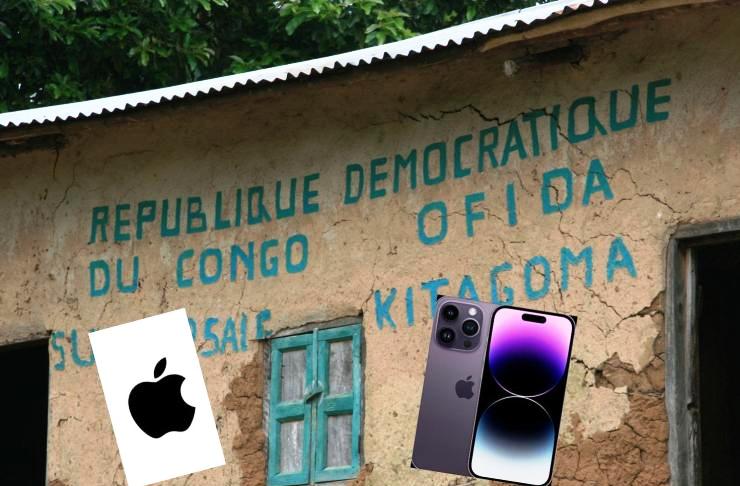
The DRC government accuses Apple of buying conflict minerals and funding armed groups in the east of the country. However, boycotts of these minerals and sanctions have so far proved ineffective
in curbing the violence.
On 25 April, lawyers hired by the government of the Democratic Republic of Congo (DRC) accused American tech giant Apple of buying conflict minerals and threatened legal action if the practice continued. In a letter to Apple CEO Tim Cook, London-based lawyer Robert Amsterdam demanded answers about the sourcing of minerals used in the company’s products. The lawyers claim that the products Apple buys are “tainted with the blood of the Congolese people”. Paris-based lawyers William Bourdon and Vincent Brengarth also sent the formal notice to two Apple subsidiaries in France.
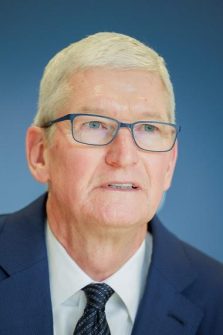
Apple CEO Tim Cook. CC BY 4.0/European Union, 2024
According to the French lawyers, “Apple has consistently relied on a number of suppliers who purchase minerals from Rwanda, a mineral-poor country that has exploited the DRC and plundered its natural resources for nearly three decades. Now Rwanda is also a producer of tantalum, tin and tungsten (the 3Ts), which are used in the electronics industry to make smartphones and computers. This prompted the European Union to sign an agreement last May to secure supplies of these minerals for the manufacture of solar panels and electric vehicles. However, the French lawyers claim that Apple bought minerals smuggled from the DRC to Rwanda, where they were laundered and “integrated into the global supply chain”.
Their accusation is based on reports that may suggest such a scenario is plausible, but no smoking gun has yet been provided. The allegation is also based on the fact that Apple’s efforts to source its minerals ethically are “notoriously inadequate”.
According to the report, “Apple appears to rely primarily on the vigilance of its suppliers and their commitment to Apple’s code of conduct”. Most importers like Apple rely on certification from the International Tin Supply Chain Initiative (ITSCI), which has numerous and serious shortcomings, the DRC government’s lawyers claim. According to a report published in October by the Belgium-based International Peace Information Service (IPIS) and the Dutch NGO PAX, importers of 3TG metals such as Apple rely on refiners and smelters to disclose key information. But information about the country and mines
of origin is often not disclosed.
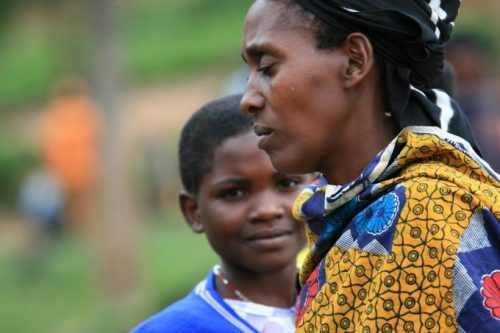
Woman from North Kivu. Military conflict in the region since 1998. Shutterstock/Sam DCruz
Both NGOs stress that EU importers’ reports are often deficient in providing information on the origin of minerals, as the data stops at the level of the smelter or refiner. As a result, China is often listed as the country of origin. The DRC government lawyers’ accusation is also based on a report by the British NGO Global Witness, which in 2022 accused the ISTCI programme, set up by the industry over ten years ago to ensure the supply of ‘conflict-free’ minerals, of contributing to the laundering of these minerals, child labour, human trafficking and smuggling out of the DRC. Global Witness claimed that industry sources at the time argued that the ITSCI programme had been set up deliberately to launder minerals.Several sources accuse the Rwandan-backed M23 rebels of smuggling the minerals that finance their activities into Rwanda or other neighbouring countries.
The M23’s seizure of the mining town of Rubaya, where tantalum is mined, in early May 2024 adds to the suspicions. However, it is not clear why Apple was specifically targeted by the Paris and London lawyers, as Tesla, Intel and Samsung are also named by the activists as companies dependent on ITSCI for their supplies.
In any case, Apple denies the allegations. “Based on our due diligence … we have not found a reasonable basis to conclude that any of the smelters or refiners of 3TG (tin, tantalum, tungsten and gold) identified in our supply chain as of 31 December 2023 have directly or indirectly financed or benefited armed groups in the DRC or any adjoining country.
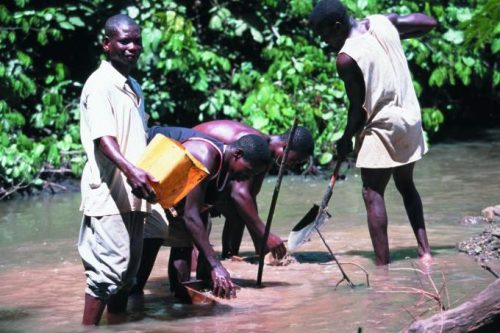
At least eight million people in eastern DRC depend in a way or another from artisanal mining. File swm
Even assuming that Apple or other companies have unintentionally funded armed groups in the DRC, it is not clear that stopping their imports from the DRC would significantly improve the security situation there. Since 2010, the United States and the European Union have imposed sanctions on actors involved in the illegal exploitation of the 3T minerals. On the ground, however, the ongoing armed conflict continues to have a severe impact on the civilian population. At the end of 2023, more than 100 armed groups were still active in the provinces of Ituri, North Kivu, South Kivu and Tanganyika, including several groups with fighters from neighbouring Rwanda, Uganda and Burundi.
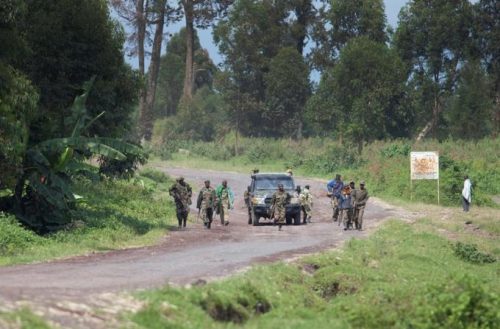
M23 fighters move along the road towards Goma. CC BY-SA 2.0/MONUSCO/Sylvain Liechti
In January 2023, the German liberal Friedrich Naumann Foundation quoted the US Government Accountability Office (GAO) as concluding that despite more than a decade of efforts to stop ‘conflict minerals’, the level of conflict in eastern DRC had not noticeably decreased. Militarisation in and around artisanal 3T mines has decreased since the implementation of responsible minerals initiatives in the sector, but at the same time militarisation in artisanal gold mines has increased.
In some cases, sanctions and boycotts have worsened the humanitarian situation and led to growing opposition to such measures from local civil society, whose grassroots organisations representing the interests of millions of artisanal miners are not consulted by those initiating these policies in the United States or Europe. It is conservatively estimated that at least eight million people in eastern DRC depend in one way or another on artisanal mining, as miners, customers, suppliers or relatives. Families rely on this income to buy medicines or pay school fees.
Congolese civil society organisations argue that the lists of Conflict Affected and High Risk Areas (CAHRA) drawn up by the Organisation for Economic Co-operation and Development (OECD), the EU or the Responsible Minerals Initiative (RMI), in which 500 companies participate, discriminate against their country, while the non-inclusion of Rwanda and Uganda gives these countries a safe status that encourages mineral smuggling through their territories. This position is also supported by 20 EU NGOs, including ActionAid, Global Witness, Diakonia and Justice & Paix.
Armed groups have been supported in part by revenues from minerals, but it is money, not mining per se, that is their primary objective. For rebel groups, mineral extraction is a means rather than an end in itself. These armed groups move on to other criminal activities, such as illegal gold mining, illegal logging or charcoal production, wildlife trafficking or extortion at roadblocks.
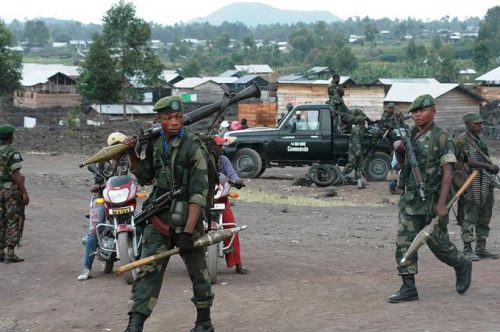
North Kivu. FARDC soldiers reinforce their presence in and around Goma. CC BY-SA 2.0/ MONUSCO/Clara Padovan
Another unintended consequence of preventing Apple or other companies from sourcing their minerals from the DRC is that the government’s FARDC troops and their Wazalendo militia allies could be negatively affected. For years, the Belgium-based International Peace Information Service (IPIS) and other observers have warned that the FARDC has been the armed group most involved in the region’s mines.
What will be the reaction of the FARDC if they cannot any longer extort money from the artisanal or more formal miners ? The Congolese soldiers receive miserable wages. A large part of them is siphoned by corrupt officers who also sell sometimes weapons and fuel to the rebels they are supposed to fight. In such conditions, the most likely scenario is that the FARDC soldiers’ priority will be to choose other preys rather than fight ethnic militias. In the end, sanctions designed in Washington or Brussels will miss their targets as long as social and political issues concerning both military and militias are not addressed by the government. And the Kinshasa authorities may sweel shoot themselves in the foot…(Open Photo: 123rf – Apple)
François Misser



